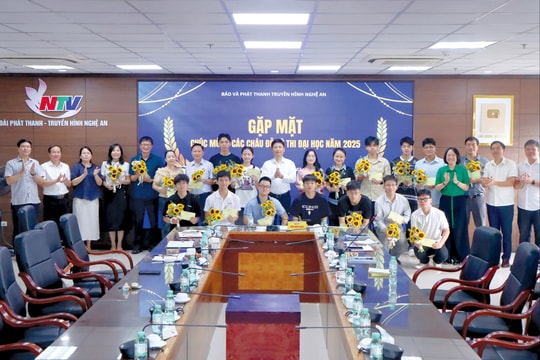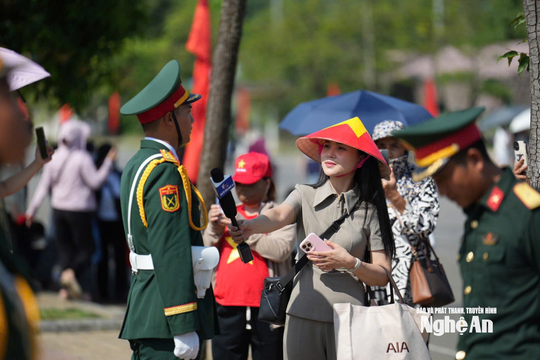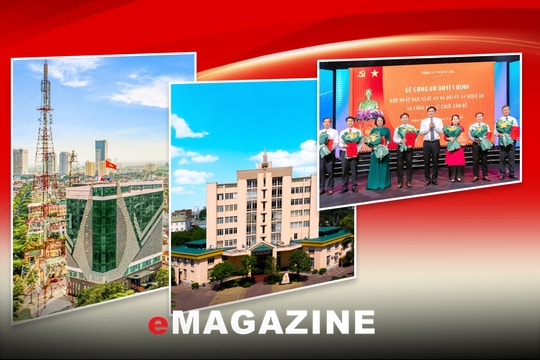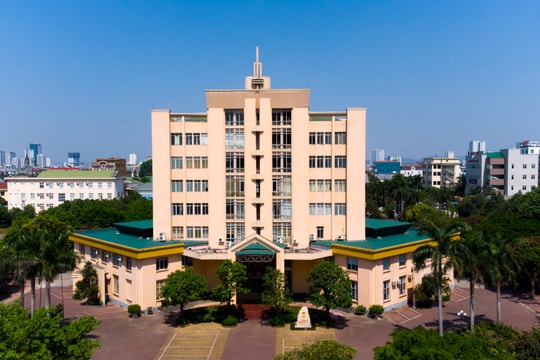From May 25, 2016, professional standards for reporters are divided into 3 categories.
From May 25, 2016, the reporter profession will be divided into 3 ranks with specific professional title standards.
The Ministry of Information and Communications and the Ministry of Home Affairs have just issued Joint Circular 11/2016/TTLT-BTTTT-BNV regulating codes and professional title standards for the positions of editors, reporters, translators and television directors in the Information and Communications sector.
This joint circular applies to the positions of editors, reporters, translators and television directors in public service units in the Information and Communications sector and to other relevant organizations and individuals.
Notably, the reporter title includes 3 ranks: Reporter Rank I (highest) - Code: V.11.02.04; Reporter Rank II - Code: V.11.02.05; Reporter Rank III (lowest) - Code: V.11.02.06.
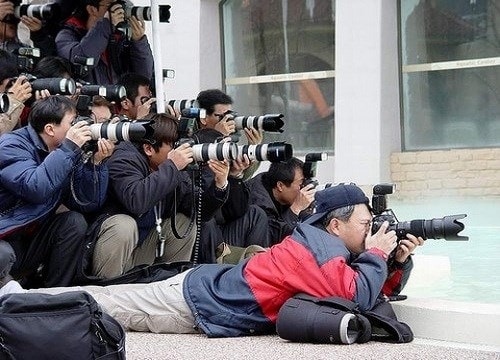 |
| Illustration photo. Source: Internet. |
With reporter level III, training and development standards include: Having a university degree in journalism or higher (in case of having a university degree in another field of journalism, one must complete a training course on journalism for 8 weeks or more); Having a level of information technology that meets the basic IT skills standards as prescribed in Circular No. 03/2014/TT-BTTTT; Having a level 2 foreign language proficiency (A2) as prescribed in Circular No. 01/2014/TT-BGDDT; Elementary political theory or higher; Having a certificate of training to meet the standards for the title of Reporter Grade III.
The professional and technical standards that a Grade III reporter must achieve include: Grasping the Party's guidelines, policies and the State's laws related to the assigned tasks; the content of the Press Law; Proficiency in professional skills; organization and operation of the industry, unit, locality and facility related to the assigned tasks and effectively performing tasks according to the provisions of the Press Law and other relevant legal provisions.
The duties of a Grade III reporter include: Developing outlines, writing news and articles as assigned and instructed by the editor-in-chief; Writing, taking photos and filming news, reports and investigations of medium complexity and taking personal responsibility for their journalistic works; Organizing work with correspondents, transacting to order news and articles according to approved outlines.
For class II reporters,Basic training and development standards are the same as for a Grade III reporter, however, foreign language proficiency must be at level 3 (B1); have a diploma in political theory or higher; have a certificate of training to meet the standards for the title of Grade II reporter.
Regarding professional standards, a Grade II reporter must meet the following standards: Grasp the Party's viewpoints, guidelines, policies, directives, resolutions and State laws on domestic and foreign affairs related to assigned tasks; understand the economic, political and social situation in the country and the world; Be proficient in professional skills; in the organization and operation of the industry, unit and locality related to assigned tasks and effectively perform tasks according to the provisions of the Press Law and other relevant legal provisions.
In particular, must have presided over at least 2 works recognized by the specialized art and science council or won awards; or participated in writing a topic in at least 1 theoretical work, theoretical research on specialized professional science (Ministry level or equivalent).
The duties of a Grade II reporter include: Developing plans, outlines, discovering and stating news topics as assigned; Organizing and writing, taking photos, filming news and articles of good quality and taking personal responsibility for their journalistic works; Detecting and proposing issues to develop editorial plans; Writing commentary articles of average complexity; Detecting and introducing informants, guiding collaborators to write according to approved outlines; Participating in compiling programs, documents and organizing professional training for lower-ranking officials; Participating in preparing content and exchanging journalistic expertise domestically and internationally.
Officials promoted from the title of Reporter Grade III to the title of Reporter Grade II must have held the title of Reporter Grade III or equivalent for at least 9 years, of which at least 3 years must have held the title of Reporter Grade III.
As for first-class reporters,Duties to be performed include: Presiding over the development of plans and scripts for press works; Organizing, directing and implementing writing, photography, and filming of press genres with comprehensive content and major topics in many fields with higher complexity; Writing comments and editorials with content related to domestic and international issues; Editing and reviewing news articles before posting them on mass media and being personally responsible for the content of those news articles; Organizing and strengthening the network of correspondents and collaborators in assigned tasks; Preparing content for domestic and international press professional exchanges; Developing goals, programs, materials and organizing professional training for lower-ranking reporters; Participating in the review board for transferring or promoting professional titles for lower-ranking reporters.
Because of the high job requirements, the training and development standards for Grade I reporters are also much higher than those for Grade II and Grade III reporters. Specifically, in addition to the standards for Grade II and Grade III reporters, Grade I reporters must have a level 4 foreign language proficiency (B2); have a diploma in advanced political theory; and have a certificate of training for the title of Grade I reporter.
Regarding standards of professional competence, one must have a firm grasp of the Party's viewpoints, guidelines, policies, directives, resolutions and the State's laws on domestic and foreign affairs; on the domestic and international economic, political and social situation; be proficient in professional expertise, effectively perform tasks according to the provisions of the Press Law and other relevant legal provisions;
Notably, must have presided over at least 4 works recognized by the specialized art and science council or won awards; or presided over at least 2 (two) theoretical works, theoretical research on specialized professional science (Ministry level or equivalent).
Also according to Circular 11, the title of Editor is divided into 3 ranks: Grade I Editor Code: V.11.01.01; Grade II Editor Code: V.11.01.02; Grade III Editor Code: V.11.01.03. The title of Translator includes 3 ranks: Translator Grade I Code: V.11.03.07; Translator Grade II Code: V.11.03.08; Translator Grade III Code: V.11.03.09. The title of Television Director also includes 3 ranks: Television Director Grade I Code: V.11.04.10; Television Director Grade II Code: V.11.04.11; Television Director Grade III Code: V.11.04.12. |
How to rank salaries of reporters, editors, translators, and television directors
The professional titles of civil servants specified in Circular 11 are subject to the professional and technical salary scale for cadres and civil servants in State-owned enterprises issued together with Decree No. 204/2004/ND-CP of the Government on salary regime for cadres, civil servants, public employees and armed forces.
Specifically, the professional titles of Grade I Editor, Grade I Reporter, Grade I Translator, and Grade I Television Director are subject to the salary coefficient of type A3 civil servants, group 1 (A3.1) from salary coefficient 6.20 to salary coefficient 8.00.
The professional titles of Editor Grade II, Reporter Grade II, Translator Grade II, and Television Director Grade II are subject to the salary coefficient of type A2, group 1 (A2.1) civil servants from salary coefficient 4.40 to salary coefficient 6.78.
The professional titles of Grade III Editor, Grade III Reporter, Grade III Translator, and Grade III Television Director are subject to the salary coefficient of type A1 civil servants from salary coefficient 2.34 to salary coefficient 4.98.
The appointment and salary classification for the above-mentioned civil servant professional titles for civil servants who have been classified into the ranks of Senior Editor (rank code 17.139), Chief Editor (rank code 17.140), Editor (rank code 17.141), Senior Reporter (rank code (17.142), Chief Reporter (rank code 17.143), Reporter (rank code 17.144), Senior Translator (rank code 17.139), Chief Translator (rank code 17.140), Translator (rank code 17.141), Senior Director (rank code 17.154), Chief Director (rank code 17.155), Director (rank code 17.156) are implemented as follows: In case the civil servant is eligible for appointment to the civil servant professional title with the coefficient and salary grade equal to For the old rank, the salary level and the percentage of seniority allowance exceeding the framework (if any) currently enjoyed in the old rank will be arranged at the same level (including the time for considering the next salary increase or considering the enjoyment of seniority allowance exceeding the framework if any in the old rank) into the newly appointed professional title.
According to Infonet

